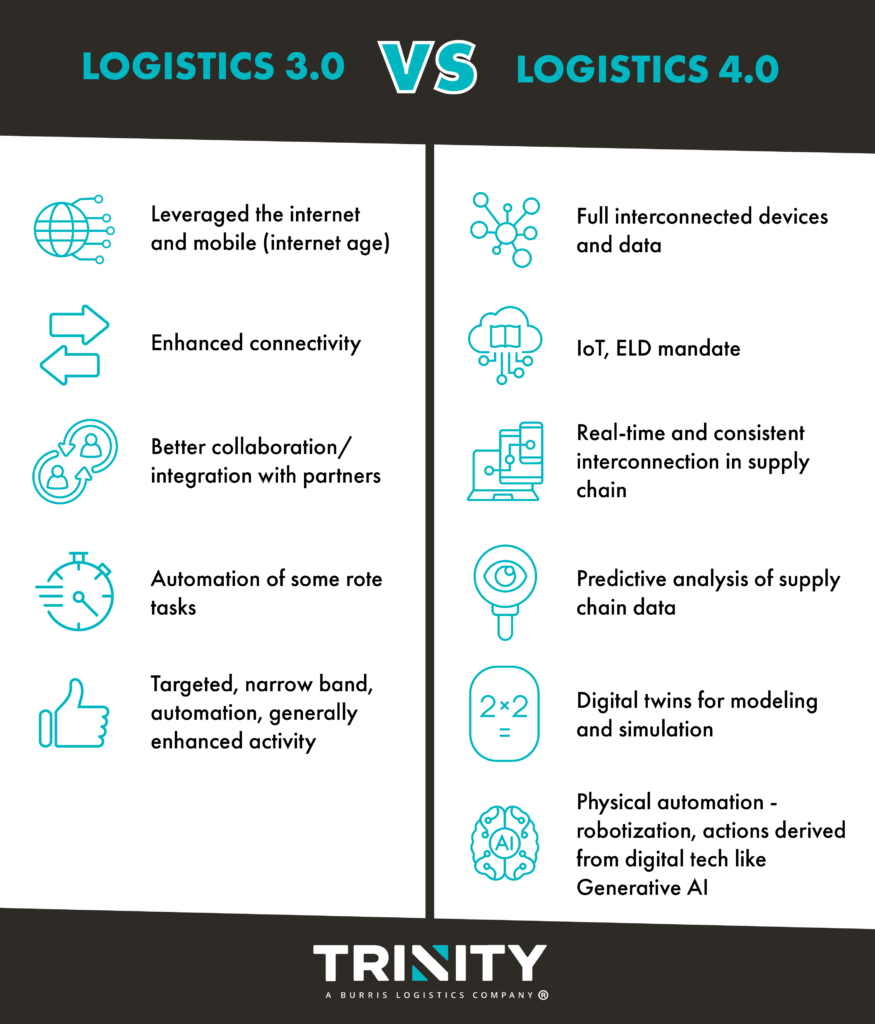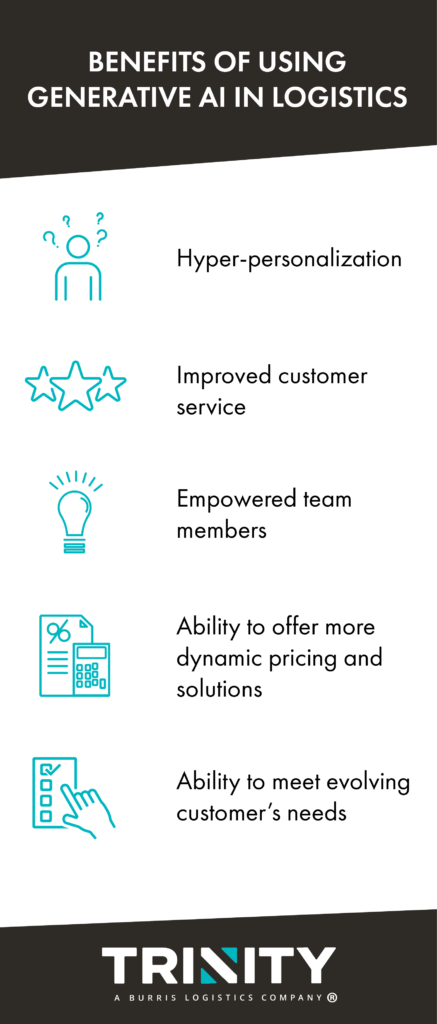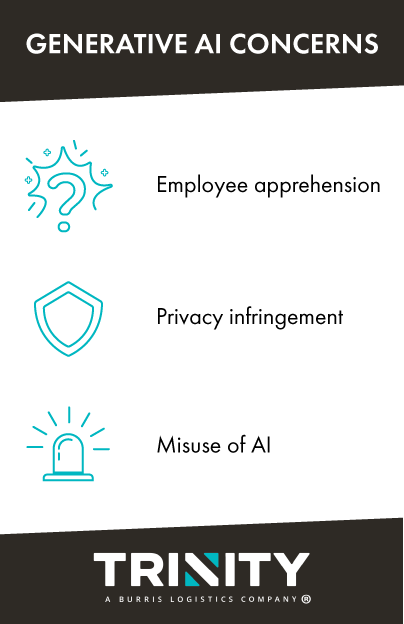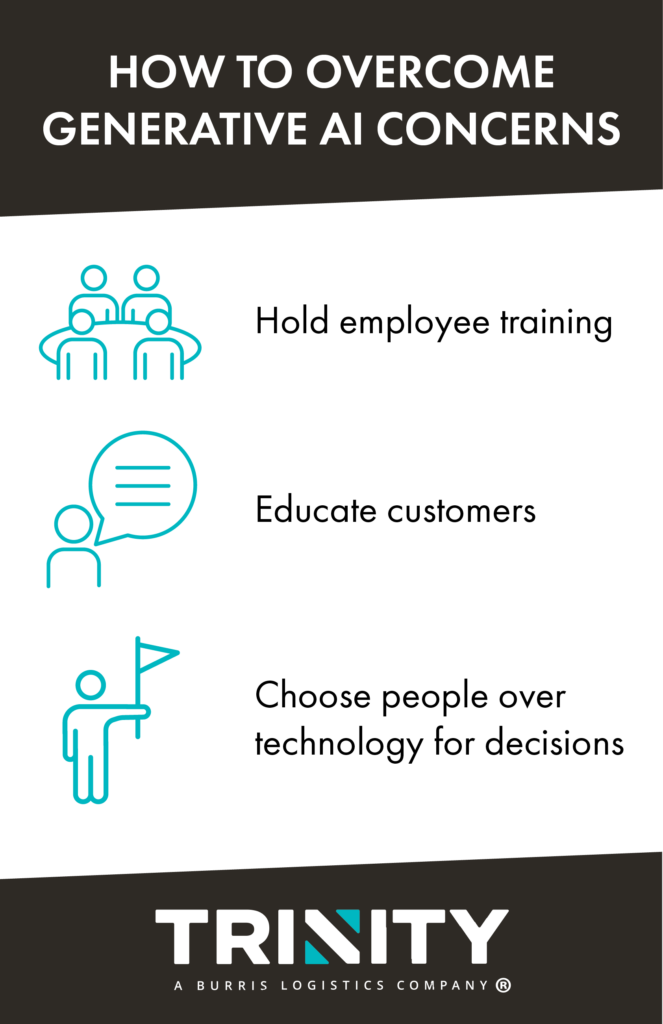
12/08/2023 by Russ Felker
The Generative AI Revolution: A Glimpse Into Logistics 4.0
As the industry pivots from Logistics 3.0 to Logistics 4.0, the role of Generative AI, a subset of artificial intelligence that can generate data like what it’s trained on, is becoming significant.
What could and should you do with this technology? Let’s follow, Alex, a seasoned logistics manager, into his journey with Generative AI in logistics. Hopefully, it will help you determine how to best apply this to your business.
Logistics 3.0 vs Logistics 4.0
Amid the hustle of daily logistics operations, Alex has found himself standing at a crossroads. The days of Logistics 3.0, with its familiar integration of technology and automation, were beginning to fade. A new era, Logistics 4.0, was dawning, bringing with it the promise of Generative AI.
In Logistics 3.0, Alex had seen the wonders of electronic data interchange, warehouse management systems, and transportation management systems. These tools paved the way for efficiency, streamlining operations, and data storage. Yet, something was missing. While data accumulated, its full potential remained untapped, and decisions largely depended on human insight.
Enter Logistics 4.0, a realm where technology is integrated and intertwined with every aspect of operations. Generative AI became Alex’s trusted advisor, offering capabilities that went beyond conventional wisdom. Here, data was stored and analyzed in real-time, creating predictive models, forecasting demand, and even simulating myriad scenarios.

Generative AI: A Helping Hand
With the introduction of Generative AI, decision-making saw a paradigm shift. No longer were decisions merely human-driven. Now, vast datasets could be processed with unparalleled speed and insights delivered directly to the team.
Alex marveled as the AI suggested new routing strategies that outperformed traditional methods. When it came to risk management, AI could paint potential risk scenarios from existing data, enabling further preparedness against unforeseen challenges.
A New Era
Where Generative AI truly shone was in its influence on hyper-personalization and customer experience.
Alex recalled a customer who had faced delivery delays in the past. Now before the customer could express any concerns, Generative AI analyzed previous interactions, preemptively providing solutions to identify and allow proactive mitigation of any delays. Such predictive customer service seemed like magic!
Customers were no longer treated with one-size-fits-all solutions either. Analyzing their preferences and behaviors, Generative AI tailored communications to fit an individual’s needs, background, and details. Natural Language Processing, powered by the same AI, equipped teams with accurate and individualized customer information. Moreover, dynamic pricing models consider each customer’s history, offering personalized pricing and discounts.
The power of Generative AI didn’t stop there. It sifted through mountains of customer feedback, highlighting sentiment and crafting actionable insights. This dynamic tool kept the team agile and evolving customer needs stay met.
In this new era of Logistics 4.0, Alex realized that the industry was undergoing more than just a technological shift. It was a transformation of values and priorities. Every customer interaction was now an opportunity to offer a more tailored, predictive experience that exceeded expectations.

Generative AI Concerns

Yet, as these capabilities expand, so do ethical concerns. Alex understood the importance of utilizing AI ethically, ensuring that it complements human skills rather than replacing them. He was also aware of the apprehensions among his team members. They feared that AI might render their roles obsolete.
To address these concerns, Alex led training programs, emphasizing the useful relationship between AI and people. He shared how Generative AI could handle vast datasets, leaving the strategic and empathetic decisions to people, who were irreplaceable in these capacities. This synergy would ensure efficient logistics while preserving job roles, emphasizing the value of human touch in an AI-driven world.
Customer interactions presented another challenge. With Generative AI’s potential to personalize experiences, there was the risk of infringing on individual privacy. Alex championed transparent communication. He educated customers about how their data was used and the measures in place to protect their privacy. Training sessions were organized to equip team members with knowledge about ethical data usage, ensuring customers felt safe and valued.
Alex also recognized the importance of avoiding the misuse of AI. Though AI could suggest new routing strategies or predict potential challenges, the decision-making power remained with people. Alex believed that AI should inform decisions, not make them autonomously, especially when people’s livelihoods were at stake.

A Whole New World of Logistics
As he looked ahead, Alex felt optimistic. In this age, where brand loyalty was deeply rooted in personalized experiences, he knew that with Generative AI by his side, they were poised to lead, innovate, and set new standards in the world of logistics.
The leap from Logistics 3.0 to 4.0 marks a significant shift from manual and reactive operations to automated, intelligent, and proactive systems. Generative AI stands at the forefront of this revolution, providing the tools necessary for logistics companies to harness the power of their data, make informed decisions, and stay ahead in the competitive market.
Get More Content Like This In Your Inbox

